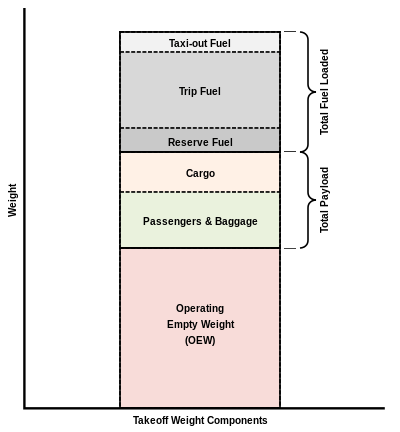Maximum takeoff weight

The maximum takeoff weight (MTOW) or maximum gross takeoff weight (MGTOW) or maximum takeoff mass (MTOM) of an aircraft is the maximum weight at which the pilot is allowed to attempt to take off, due to structural or other limits. The analogous term for rockets is gross lift-off mass, or GLOW. MTOW is usually specified in units of kilograms or pounds.
MTOW is the heaviest weight at which the aircraft has been shown to meet all the airworthiness requirements applicable to it. MTOW of an aircraft is fixed, and does not vary with altitude or air temperature or the length of the runway to be used for takeoff or landing. A different weight the "maximum permissible takeoff weight", or "regulated takeoff weight", varies according to flap setting, altitude, air temperature, length of runway and other factors. It is different from one takeoff to the next, but can never be higher than the MTOW.
Certification standards
Certification standards applicable to the airworthiness of an aircraft contain many requirements. Some of these requirements can only be met by specifying a maximum weight for the aircraft, and demonstrating that the aircraft can meet the requirement at all weights up to, and including, the specified maximum. These requirements include:
- structural requirements – to ensure the aircraft structure is capable of withstanding all the loads likely to be imposed on it during maneuvering by the pilot, and gusts experienced in turbulent atmospheric conditions.
- performance requirements – to ensure the aircraft is capable of climbing at an adequate gradient with all its engines operating; also with one engine inoperative.
At the MTOW, all aircraft of a type and model must be capable of complying with all these certification requirements.
Multiple MTOW
With several of the manufacturers of large aircraft, the same model of aircraft can have more than one MTOW. An operator can choose to have the aircraft certified for a reduced weight, often for a reduced cost with an option to later increase the MTOW for a fee and the cost of certification change. Some airlines which do not require a high MTOW choose to have a lower MTOW for that particular aircraft to reduce costs (Landing fees and air traffic control fees are MTOW based).[1]
In other examples an increased MTOW option is achieved by reinforcement due to additional or stronger materials. For example, the Airbus A330 242 tonnes MTOW variant / A330neo uses Scandium–aluminium to avoid an empty weight increase.[2][3] Smaller aircraft like the Cessna 208 Caravan may have an option for a reinforced undercarriage to permit an increase in MTOW.
Maximum permissible takeoff weight or maximum allowed takeoff weight
In many circumstances an aircraft may not be permitted to take off at its MTOW. In these circumstances the maximum weight permitted for takeoff will be determined taking account of the following:
- Wing flap setting. See the Spanair Flight 5022 crash
- Airfield altitude (height above sea-level) – This affects air pressure which affects maximum engine power or thrust.
- Air temperature – This affects air density which affects maximum engine power or thrust.
- Length of runway – A short runway means the aircraft has less distance to accelerate to takeoff speed. The length for computation of maximum permitted takeoff weight may be adjusted if the runway has clearways and/or stopways.
- Runway wind component – The best condition is a strong headwind straight along the runway. The worst condition is a tailwind. If there is a crosswind it is the wind component along the runway which must be taken into account.
- Condition of runway – The best runway for taking off is a dry, paved runway. An unpaved runway or one with traces of snow will provide more rolling friction which will cause the airplane to accelerate more slowly. See the Munich air disaster
- Obstacles – An airplane must be able to take off and gain enough height to clear all obstacles and terrain beyond the end of the runway.
The maximum weight at which a takeoff may be attempted, taking into account the above factors, is called the maximum permissible takeoff weight, maximum allowed takeoff weight or regulated takeoff weight.
See also
- Aircraft gross weight
- List of airliners by maximum takeoff weight
- Maximum zero-fuel weight
- Operating empty weight
References
- ↑ "ICAO's Policies on Charges for Airports and Air Navigation Services" (PDF). Retrieved 15 September 2013.
- ↑ FARNBOROUGH: Airbus outlines A330neo engineering demands
- ↑ Scalmalloy aluminum-magnesium-scandium alloy Airbus Technology